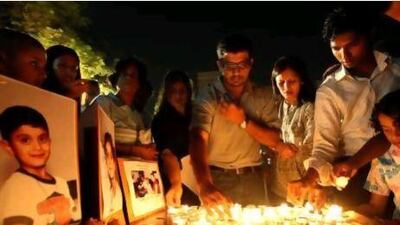DUBAI // Patients who have been poisoned by pesticides are being mistreated for food poisoning because hospitals mistake their similar symptoms, according to Dubai Municipality.
The warning comes after 10 people were recently admitted to the Iranian Hospital and initially treated for food poisoning. It was later found they were affected by pesticides that had been sprayed in a neighbour's flat.
Such inaccurate assessments can have grave consequences, officials said.
"Misdiagnoses sometimes lead to death," said Asia Al Raeesi, the head of the food planning and studies section at the municipality's food control department. Right diagnosis can ensure patients get appropriate treatment at the time of admission.
"Doctors should increase awareness and collect more information. They should raise this issue, especially because the case of misdiagnosed chemical poisoning is increasing."
Training doctors and emergency medical staff was the way forward, officials said. Dubai Municipality has held workshops for nearly 40 private and public hospitals, and has proposed more this year.
The most common form of chemical poisoning in the Emirates is from pesticides, Ms Al Raeesi said.
In the most recent case, on May 16, staffat a jewellers in Deira woke up in the early-morning hours with diarrhoea, vomiting and dizziness.
After municipality officials found a banned chemical - aluminium phosphate - in the neighbour's flat, the men were successfully treated for chemical poisoning.
Doctors often prefer to start treatment before testing samples of blood or urine to determine the source of the poisoning, Ms Al Raeesi said. "There needs to be appropriate training for doctors to decide which case needs sampling."
The lack of timely medical attention has resulted in several "unsolved mysteries", according to Bashir Hasan Yousif, a food safety expert at the municipality.
One such case was the death of a nine-year-old boy last month. Awad Khan, his 15-year-old brother and their parents were taken to Al Baraha Hospital with similar symptoms - nausea, dizziness, diarrhoea and vomiting. The rest of the family recovered, but Awad died. Municipality officials and police ruled out food and pesticide poisoning. A month later, his parents still do not know what killed him.
Similarly, the cause behind the 2009 deaths of Chelsea D'Souza, 7, and Nathan, 5, who died after eating at a cafeteria in Dubai, remain unknown. Officials had ruled out food poisoning.
Mistaking signs of poisoning is an issue in the capital, also.
The number of poisoning cases may be much higher than the 119 reported in Abu Dhabi over the past two years, Dr Sharif said.
Mohamed Baniyas, a consultant toxicologist at Tawam Hospital in Al Ain, said doctors should consider three aspects when treating poison cases - vital signs, type and severity of symptoms and lab tests. Lab tests alone can be restrictive, he said. "With about 500 million poisons, only about 50 can be detected in the laboratories," said Dr Baniyas, one of only three toxicologists in the capital.
Cost and time are factors, also. The average cost of a blood test is Dh 1,000, and multiple tests may be required, depending on the toxin. It can take up to two days to get the results.
Dr Arif Al Nouriani, chief executive of Al Qassimi Hospital, said lab tests were conducted only when the illness was severe.
"Sometimes the symptoms are clear and [the diagnosis] is obvious," he said. "These tests take time and are very costly. But, of course, if someone is in a state of shock or between life and death, then we will conduct further analysis."
Hospital officials say that even when they have the necessary samples, the correct diagnosis can still be difficult.
"What happens in a case where the pesticide has combined with the food, or where the food hasn't been properly washed?" asked Ahmad Al Khudeim, director of Al Baraha Hospital, where Awad Khan and his family were admitted. "Would that be considered food poisoning or pesticide poisoning? The fact that it's poisoning is clear, but identifying the type of poisoning can be tricky."
mismail@thenational.ae

